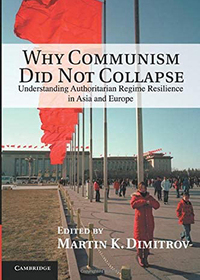
- Tulane University
- Associate Professor
- Residential Fellow (2011-2012)
- “Dictatorship and Information: Autocratic Resilience in Communist Europe and China”
Martin Dimitrov is an Associate Professor of Political Science at Tulane University and also serves as a Research Fellow at the East Asian Legal Studies Program at Harvard Law School and an Associate at the Davis Center for Russian and Eurasian Studies at Harvard University. He specializes in Chinese politics and has a special interest in the resilience of authoritarian regimes, the transition from communism to post-communism, and property rights.
He is the author of Piracy and the State: The Politics of Intellectual Property Rights in China (Cambridge University Press, 2009) and is currently working on two book projects: a monograph entitled Dictatorship and Information: Autocratic Resilience in Communist Europe and China and an edited volume entitled Why Communism Didn’t Collapse: Understanding Regime Resilience in China, Vietnam, Laos, North Korea, and Cuba. Professor Dimitrov has been awarded residential fellowships from the Woodrow Wilson International Center for Scholars; the Hoover Institution (declined); the American Academy in Berlin; the Center on Democracy, Development, and the Rule of Law at Stanford; the Davis Center for Russian and Eurasian Studies at Harvard; and the Fairbank Center for Chinese Studies at Harvard.
Publications
-
Why Communism Did Not Collapse: Understanding Authoritarian Regime Resilience in Asia and Europe
Cambridge University Press, 2013

This volume brings together a distinguished group of scholars working to address the puzzling durability of communist autocracies in Eastern Europe and Asia, which are the longest-lasting type of nondemocratic regime to emerge after World War I. The volume conceptualizes the communist universe as consisting of the ten regimes in Eastern Europe and Mongolia that eventually collapsed in 1989–91, and the five regimes that survived the fall of the Berlin Wall: China, Vietnam, Laos, North Korea, and Cuba. Taken together, the essays offer a theoretical argument that emphasizes the importance of institutional adaptations as a foundation of communist resilience. In particular, the contributors focus on four adaptations: of the economy, of ideology, of the mechanisms for inclusion of potential rivals, and of the institutions of vertical and horizontal accountability. The volume argues that when regimes are no longer able to implement adaptive change, contingent leadership choices and contagion dynamics make collapse more likely. By conducting systematic paired comparisons of the European and Asian cases and by developing arguments that encompass both collapse and resilience, the volume offers a new methodological approach for studying communist autocracies.